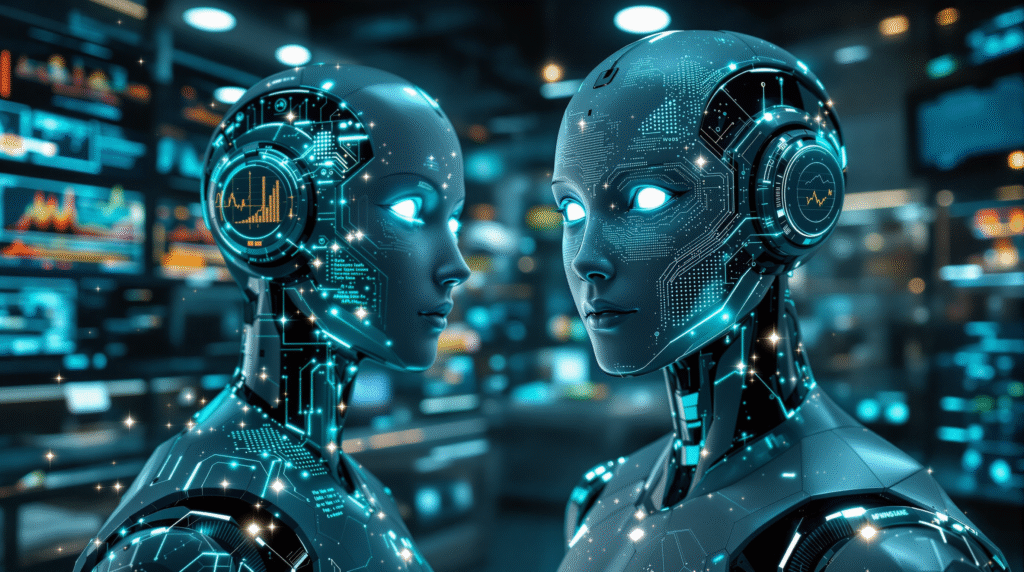Introduction: AI Agents – The Key to Understanding Modern Artificial Intelligence
AI agents are one of the foundations of contemporary artificial intelligence. These are programs or systems that can independently observe their environment, analyze data, and make decisions to achieve a specific goal. Thanks to AI agents, it is possible to automate many processes, personalize services, and solve complex problems in various fields—from business and medicine to education and entertainment. Understanding what AI agents are and what features they have is the first step to effectively using modern technologies and creating your own innovative solutions. In the following sections, we will look at the most important properties of AI agents that are worth knowing at the beginning of your journey with this technology
Autonomy: The Ability to Act and Make Decisions Independently
One of the key features of AI agents is autonomy. This means that the agent can operate independently, without constant human intervention. An autonomous agent analyzes data from its environment, recognizes situations, and makes decisions based on programmed rules or acquired experience.
An example of autonomy is a smart thermostat that independently regulates the temperature in a home by analyzing weather conditions and the preferences of household members. Another example is autonomous vehicles, which can move on roads and respond to changing traffic conditions.
The autonomy of AI agents enables the automation of many tasks, increases efficiency, and relieves people from routine activities. It is precisely this feature that makes AI agents increasingly popular and useful in everyday life.
Perception: Receiving and Interpreting Information from the Environment
Perception is the ability of an AI agent to receive information from its environment and interpret it. Thanks to perception, the agent can understand what is happening around it and respond appropriately to changing conditions. The source of data can be various types of sensors (e.g., temperature, light, motion), cameras, microphones, as well as text data or signals from the internet.
An example of perception is a chatbot that analyzes the text entered by the user and, based on this, recognizes intentions and provides answers. In smart homes, AI agents receive signals from motion or light sensors to automatically control lighting or alarms. The better the perception, the more effective and flexible the agent is in its actions.
Action: Responding to Stimuli and Achieving Goals
Action is another key feature of AI agents. It means the ability to take specific actions in response to stimuli from the environment or to achieve a specific task. Actions can be very different—from sending a response in a chat, through turning on a device, to performing a complex sequence of operations.
For example, an AI agent in a recommendation system can suggest a new product to a user based on their previous choices. In an autonomous car, the agent makes decisions about accelerating, braking, or changing lanes in response to the situation on the road. The effectiveness of the agent’s action depends on the quality of perception, the speed of analysis, and the accuracy of the decisions made.
Learning: Adapting to Changing Conditions and Improving Skills
Learning is one of the most important features of modern AI agents. Thanks to the ability to learn, an agent can analyze its previous actions, draw conclusions from successes and mistakes, and adapt its behavior to new situations. Learning allows agents not only to perform repetitive tasks but also to develop and become increasingly effective.
Examples include recommendation systems, which, based on a user’s choice history, better and better match product or movie suggestions. In autonomous vehicles, AI agents learn from thousands of hours of driving to better respond to unusual situations on the road. Learning can take place in various ways—from simple rules, through supervised learning, to advanced reinforcement learning algorithms.
Intelligence: The Ability to Solve Problems and Plan
The intelligence of AI agents is manifested in their ability to solve problems, plan actions, and make accurate decisions in complex situations. An intelligent agent can analyze many factors at once, predict the consequences of its actions, and choose the best strategies to achieve its goal.
For example, an AI agent in a computer game can predict an opponent’s moves and plan its own strategy accordingly. In business, intelligent agents analyze market data, forecast trends, and support managers in decision-making. The higher the level of an agent’s intelligence, the more independent and effective it is in carrying out assigned tasks.
The intelligence of AI agents is not just about fast data processing, but also the ability to think creatively, adapt, and solve new, previously unknown problems.
Interaction: Communication with People and Other Agents
Interaction is the ability of AI agents to communicate both with users and with other agents or systems. Thanks to this feature, agents can exchange information, collaborate on complex tasks, and better understand users’ needs.
An example of interaction is chatbots, which conduct conversations with customers, answer questions, and help solve problems. In multi-agent systems, AI agents cooperate with each other, sharing data and coordinating actions, for example in logistics or urban traffic management. Effective communication increases the efficiency of agents and enables the implementation of more advanced projects.
Flexibility: Adapting to Different Tasks and Environments
Flexibility is the ability of AI agents to adapt to different conditions and perform various tasks. A flexible agent can change its behavior depending on the situation, learn new skills, and adjust to new requirements.
For example, an AI agent in a smart home can manage lighting, heating, and security, adjusting its actions to the time of day, the presence of household members, or weather conditions. In business, flexible agents can analyze different types of data, handle various processes, and quickly respond to market changes.
Flexibility makes AI agents universal and allows them to be used in many industries and for solving a wide range of problems.
Security: Data Protection and Avoiding Undesirable Outcomes
Security is one of the most important issues when designing and implementing AI agents. Agents often process sensitive user data, such as personal information, financial details, or health data. Therefore, it is crucial to provide appropriate protection mechanisms—data encryption, access control, and regular system monitoring for threats.
It is also important for AI agents to be resistant to external attacks and malfunction. Emergency scenarios should be anticipated, the agent should be tested in various conditions, and the software should be regularly updated. Security also includes protection against undesirable outcomes of the agent’s actions, such as incorrect decisions that could harm the user or the company.
Ethics: Acting in Accordance with Principles and Values
Ethics in the context of AI agents means designing and implementing systems that operate in accordance with applicable legal, social, and moral standards. AI agents should be transparent in their actions, and users should know how and why certain decisions are made.
It is also important to avoid bias in data and algorithms so that the agent does not discriminate against any group of users. An ethical AI agent should care for the user’s well-being, protect their privacy, and act responsibly. More and more often, companies and organizations are implementing ethical codes and audit procedures to ensure that AI agents comply with social values and expectations.


